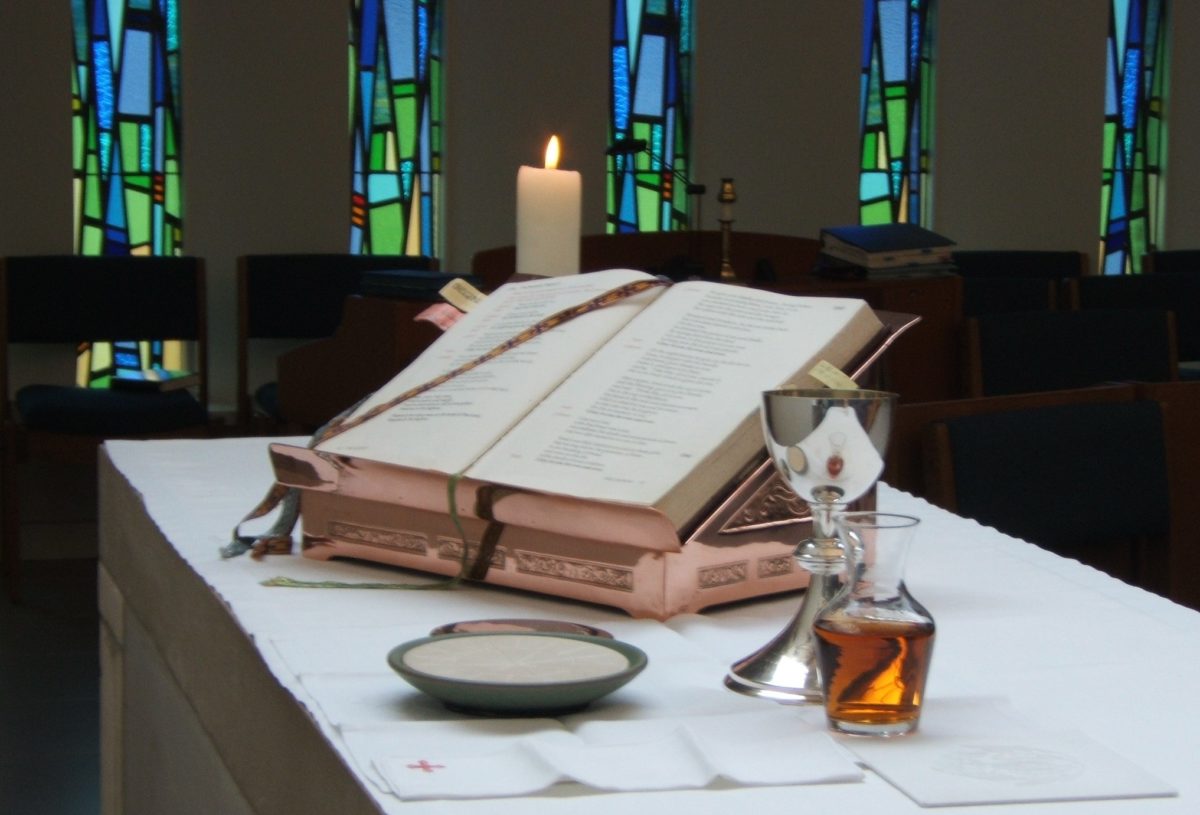By Sr. Wendy Grace, SSJD
Readings: 1 Kings 8:22-30, Psalm 122, 1 Peter 2:1-5, 9-10, John 20:19-21 (NRSV)

Today, January 17th is the day we celebrate the consecration of the Chapel of St. John the Divine. To consecrate means ‘to make or declare sacred, to set apart as sacred, to devote to a purpose.’ Consecration changes spaces and objects and people. Consecration changes how space and physical objects are used and it changes how people live their lives.
Consecration then is a type of transformation. As I looked through the readings for today I saw in them a story of transformation – transformation of physical space, transformation of individuals, transformation of relationships and transformation of purpose.
In the reading from 1 Kings Solomon sees the building of the temple – a physical transformation of space – as the fulfillment of God’s covenant with his father David. Solomon recognizes that the Lord, the God of Israel does not dwell on earth, that God cannot be contained even by heaven and the highest heaven.
This is not just a transformation of physical space this is also a change in the way the people of Israel see themselves and their God. It is also a not so subtle message to the nations around Israel that Israel’s God is much greater than any of their gods. Israel’s God can and will hear prayers whenever and wherever they are prayed.
The epistle issues an invitation, an invitation to turn to Jesus, a living stone which, though rejected by mortals, is chosen and precious in God’s sight. This is an invitation to choose between attitudes and behaviours which bring death and those which bring life. In responding positively to the invitation to turn to the living stone, we can be transformed into living stones as well.
We are encouraged to be living stones and to allow ourselves to be built into a spiritual house – and why are we invited to do this? Because we are a royal priesthood, a holy nation, God’s own people. We have been changed, we have been transformed, we have been consecrated, once we were not a people but now we are God’s people, once we had not received mercy but now we have received mercy
In the Gospel of John, we learn about the cost of being consecrated, of being set aside for a purpose. Jesus comes to the disciples on the very day of his resurrection. They are together behind locked doors because they are afraid and Jesus appears among them. Once the disciples are sure Jesus really is Jesus they rejoice. And then Jesus says to them, ‘As the Father has sent me so I send you.’ Up until now the disciples have followed. Now it is time for the disciples to lead, to be sent. The situation has changed and the disciples, although they may not know it, have been transformed because of their encounter with the risen Lord and now they must go. The other side of being called is always to be sent. The disciples have had a transformation of both their relationship with Jesus Christ and their purpose, their vocation.
Once I got to this point in my reflection I finally acknowledged the feeling of discomfort which has been bothering me since I started thinking about today. I think what has been bothering me is our current reality of living during a global pandemic. I’ve had a bit of an earworm going on. An earworm is ‘a catchy and/or memorable piece of music or saying that continuously occupies a person’s mind.’ The earworm is a song I learned about 25 years ago when I was teaching Sunday School. It goes like this:
‘The church is not a building
The church is not a steeple
The church is not a resting place
The church is a people’
And then the chorus:
‘I am the church, you are the church,
we are the church together,
all who follow Jesus all around the world,
yes, we are the church together!’
It even has actions.
It’s easy to sing a Sunday school chorus proclaiming the church is not a building but the reality is here we are in our own chapel while our sisters and brothers in faith are largely excluded from their sacred spaces. And that means that if we truly love God and our neighbours as ourselves then we have to acknowledge that fact. And that gets to the heart of what sacred space is for – of why it matters. The collect for today articulates the reasons we come to sacred space, “to praise God, to ask for forgiveness, to know God’s healing power, to hear God’s word and to be nourished by the body and blood of God’s Son.”
We’re fortunate in that we have our own chapel and that we have a sister who is also a priest. It is true that we are the church and that the church is a people. But it is also true that sacred space offers us transcendent experiences which are not available elsewhere. At the moment we have access to a sacred space and the means to use it while many of our sisters and brothers don’t.
If I can’t be at one of our services one of my sisters will fill in for me. Or if I am here physically but not mentally it doesn’t matter – the community around me will hold me up. I believe that our continued faithful witness here day after day is a way of upholding our sisters and brothers in faith. It is a way of keeping the light on.
The community transformed this physical space into the Chapel of St. John the Divine. Buildings come and go. Chapels are consecrated and then deconsecrated. Everything changes. Nothing stays the same. But, in our faithful, regular use of this space we are being transformed and in turn transforming the world.


